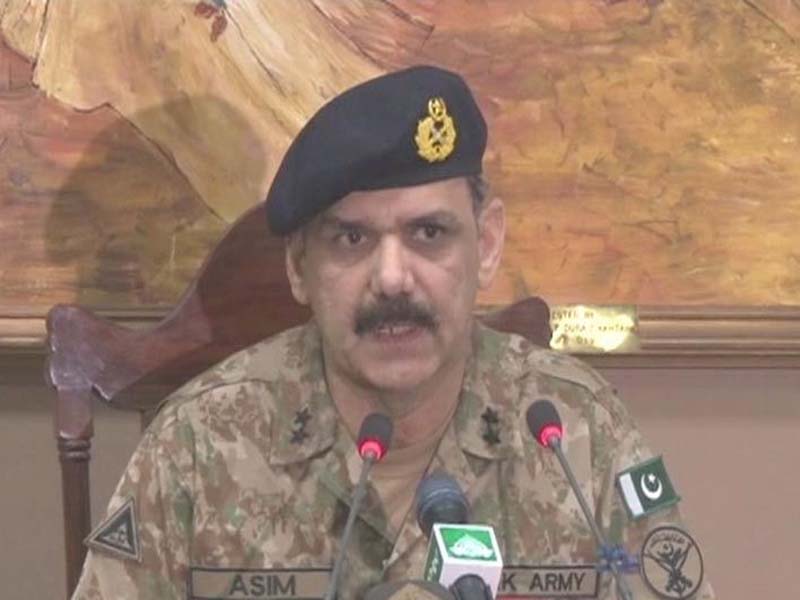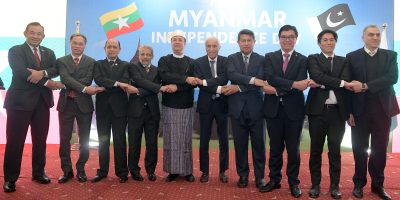More work left to be done in Karachi operation: DG ISPR

KARACHI: Boasting the successes and statistics regarding the Rangers-led Karachi operation, Inter-Services Public Relations (ISPR) Director General Lt Gen Asim Bajwa said on Friday that more work needed to be done to completely rid the metropolis of violence and terrorism.
Addressing a press conference here, Lt Gen Bajwa said the Karachi operation was commenced in Sept 2013 at a time when criminality, targeted killing and kidnapping for ransom were at their peak in the city.
During the operation, he said, over 12,000 people were arrested in more than 7,000 raids conducted by Rangers, out of which 6,000 people were handed over to police.
The biggest terrorist groups operating in Karachi are Al Qaeda in the Indian Subcontinent and Lashkar-e-Jhangvi (LeJ) which conducted attacks in the city in collusion with the Tehreek-i-Taliban (TTP) Pakistan, Bajwa said.
He said all the terror outfits are trying to consolidate and conduct attacks in the city. A pool of terrorists utilised by all the terrorist groups, including 94 hardcore terrorists, was arrested. Some 26 of these terrorists carried head money, he said.
The same group had planned and executed the Kamra base attack, attack on ISI base in Sukkur, Karachi Airport attack, Karachi jail break attempt and assassination of Karachi’s top cop Chaudhry Aslam.
Al Qaeda in the Sub continent leader Mussannah is the mastermind and arranges financing for the group’s operations in Karachi. He is number two to the leader who is present in Afghanistan, the ISPR spokesman said.
Another facilitator Huzaifa is being searched for and “we believe he is in Afghanistan”. ‘People unintentionally facilitate terrorists’
The number of terror incidents in Karachi have cut down drastically, Bajwa said, but appealed to the citizens at large to be aware of their surroundings “so as not to be come a tool or accessory to these terror bids”.
Target killing in Karachi declined by 70 per cent while an 85pc decrease in incidents of extortion and 90pc decrease in kidnapping for ransom cases was witnessed.
As part of Zarb-i-Azb, he said, “all terrorist sanctuaries in the Federally Administered Tribal Areas (Fata) have been wiped all with the exception of a few pockets.”
Lt Gen Bajwa said the “nearly executed” Hyderabad jail break plan was foiled in an operation.
The bid was an attempt to set free Daniel Pearl murder case accused Ahmed Omar Saeed Sheikh and another suspect jailed for involvement in attack on the Corps Commander Karachi several years ago, he said.
The perpetrators also had a list of 35 prisoners they wanted to kill, he said. A police constable who was abbetting these terrorists has been arrested.
Bajwa also showed a map used by the terrorists while planning the Hyderabad jail break.
He also produced before the media three “high-value targets” apprehended by security forces — namely Naeem Bukhari, Muhammad Farooq alias Musanna and Sabir Khan — who were involved in the Hyderabad jail break attempt.
Responding to a question, the ISPR spokesman said that the presence of military personnel in urban centres was not unique to Pakistan as “troops in combat gear can be seen in all civilised societies including the United States and Italy.”
“There is a shift in the deployment of security around the whole world … they are learning,” he said.
“These military personnel are there for your own security – many have died in service of this nation.”
The ‘operation’ against criminal elements in Pakistan’s commercial hub was initiated back in September 2013 after the federal cabinet empowered Rangers to lead a targeted advance with the support of police against criminals already identified by federal military and civilian agencies for their alleged involvement in targeted killings, kidnappings for ransom, extortion and terrorism in Karachi.
A high-level apex committee meeting chaired by the Chief of Army Staff Gen Raheel Sharif on May 14, 2015 decided to implement effective policing and surveillance in the “vast suburbs of Karachi”, to prevent what the military spokesperson said were “sneaking terrorist attacks”
Related News

Independence Day of Myanmar celebrated in style
In his statement, Ambassador Wuuna Han reflected on Myanmar’s rich cultural heritage, from the goldenRead More

Indian govt continues persecution of Sikhs
Ramesh Singh Arora, Minister for Human Rights and Minorities of Punjab Province, delivered a strongRead More


Comments are Closed